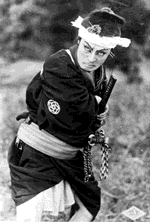HOME
![[Matsuda company logo]](../images/matsuda_base.gif)

(1928) Produced at The Nikkatsu Kyoto Film Studio
Incomplete Version
Running time: 6 minutes
Original story, scenario and direction: Ito Daisuke
Cinematography: Karasawa Hiromitsu
Cast
Yasube Nakayama: Ookochi Deniiro
Nakayama's uncle Sugano Rokuroemon: Jitsukawa Enichiro
The maidservant: Ichikawa Harue
Townsman: TogiKan (Ban Junzaburo)
OUTLINE
Nakayama Yasube (Ookochi Denjiro) is a ronin (an
unemployed masterless samurai). He lives in a poor section of Edo
(the present Tokyo). He spends his time drunk on saki that he
buys with money he gets from settling fights. When he comes
across a scuffle, he breaks it up, forces the two parties to make
up, and demands payment for his services. His nicknames are
Fighting Yasu and Carefree Yasu.
The date is July 21st, 1694. Yasube returns home drunk after having broken up a fight. There is a letter from his uncle who has been challenged by some bad samurai. He has gone to Takadanobaba, where he will do battle. He is greatly outnumbered. Yasube, immediately comes to his wits, grabs his sword and sets off in a dash. After covering the long distance at faster than marathon pace he finds that the battle has already begun. His sword is swift as he finishes off tens of the enemy.
COMMENTARY
This story is very well-known in Japan. Nakayama Yasube
went on to marry the woman who gave him a ribbon as he stopped to
pray along the way to Takadanobaba. He became a servant to her
father, Asano Takuminokami and was a member of the 47 ronin,
former Asano servants, who revenged their master's death and were
forced to commit seppuku. Nakayama's tale has been passed on
down the years as one of many legendary samurai heroes. The story
of this battle at Takadanobaba has been made into many Chambara
(sword fighting) films.
Ookochi Denjiro, who plays Nakayama Yasube in this film, was one of the most popular of the top stars of Japanese period dramas from 1927 to the early part of the 1950k. After the release of this film in 1928, and during the next few years, Ookochi was unquestionably Japan's top star. The series of films that he made with director Ito Daisuke drew fanatical reactions from its audiences.
Until 1927, when Ito Daiuke released Chuji's Voyages (Chuji Tabinikki), also starring Ookochi Denjiro, chambara films were no more than entertaining action pieces. Ito added his own touch of humanity and technical expertise to this genre and gained recognition as a master of his trade. During the following few years the trio of Ito, Ookochi and cinematographer Karasawa Hiromitsu, turned out one hit after another shaping the golden age of the Japanese period drama and demonstrating tremendous influence. However, except for their 1931 Oatsurae Jirokichigoshi, the films that they made remain only in fragmentary form. Blood Splattered Takadanobaba was originally a feature length film, but all that remains is this short version.
![[Matsuda company logo]](../images/matsuda_base.gif)